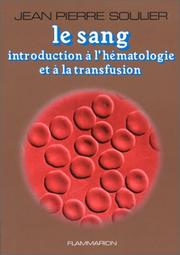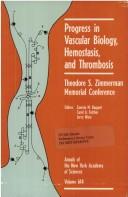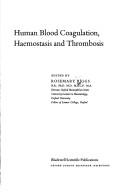| Listing 1 - 10 of 10 |
Sort by
|
Book
Year: 2010 Publisher: Bruxelles: UCL,
Abstract | Keywords | Export | Availability | Bookmark
 Loading...
Loading...Choose an application
- Reference Manager
- EndNote
- RefWorks (Direct export to RefWorks)
Vitamin K antagonists are medicines which are widely prescribed throughout the world. The effectiveness of these treatments is dependent on a delicate balance, which is influenced by many factors both specific to the patient and the environment: a low dose may be insufficient for therapeutic effectiveness, while a high dose may increase the risk of bleeding. A regular measurement of a biological parameter called International Normalized Ratio is required in order to provide a personalised adaptation of the dose. In order to optimise the anticoagulation, each patient treated by vitamin K antagonists has to reach a target value of this biological indicator. Since the anticoagulant response is influenced by many factors and varies from one patient to another, we propose to study the potential influence of the genetic constitution of each individual, as a basis of individual variations. Pharmacogenetics assesses the role played by genetic factors on the clinical response to drugs. In the case of vitamin K antagonists, the genes that influence the response to the drug are those involved in their metabolism and in the synthesis of the target on which they act. Many studies have been conducted in order to highlight the importance of these genes and their polymorphisms in the therapeutic effect of oral anticoagulants. These have demonstrated a clear relationship between some genetic polymorphisms and the anticoagulant effect of vitamin K antagonists. Dosage algorithms can help the practitioner to determine the initial dose to be prescribed. Unfortunately, these algorithms are only available for warfarin, which remains the most widely prescribed anticoagulant in the world. In Belgium, the use of acenocoumarol is more frequent compared to warfarin. However, genetic data in relation to warfarin are more abundant compared to acenocoumarol. We will analyse several clinical trials showing that both compounds have similar characteristics and suggesting the importance of pharmacogenetics for their clinical use Les antagonistes de la vitamine K sont des médicaments largement prescrits partout dans le monde. L’efficacité et la sécurité de ces traitements reposent sur un équilibre fragile, influencé par des facteurs environnementaux et des facteurs propres au patient: une dose trop faible est insuffisante pour obtenir une efficacité thérapeutique alors qu’une dose trop élevée peut augmenter les risques de saignements. Une adaptation strictement individuelle du traitement est nécessaire par mesures régulières d’un paramètre biologique appelé International Normalized Ratio. Pour chaque patient traité par antagonistes de la vitamine K on détermine une valeur cible de cet indicateur biologique pour obtenir un niveau anticoagulant optimal. Puisque la réponse anticoagulante est influencée par de nombreux facteurs et qu’elle est variable d’un patient à l’autre, pourquoi ne pas s’intéresser à la constitution génétique de chaque individu qui est une des bases de la variabilité individuelle? La pharmacogénétique s’engage à étudier l’influence des caractéristiques génétiques des patients sur la réponse clinique aux traitements médicamenteux. Dans le cas des antagonistes de la vitamine K, les gènes qui influencent la réponse aux médicaments sont ceux qui interviennent dans leur métabolisme et dans la synthèse de la cible sur laquelle ils agissent. De nombreuses études ont été menées dans le but de mettre en évidence l’importance de ces gènes dans la réponse aux anticoagulants oraux. Elles ont démontré une association claire entre certains gènes et la réponse anticoagulante aux antagonistes de la vitamine K. Des algorithmes de dosage peuvent aider le praticien à déterminer la dose initiale à administrer au patient. Malheureusement, ces algorithmes ne sont actuellement disponibles que pour la warfarine qui reste l’anticoagulant le plus prescrit dans le monde. En Belgique, l’utilisation de l’acénocoumarol est plus fréquente que celle de la warfarine. Cependant, les données génétiques concernant la warfarine sont plus abondantes. Nous analyserons plusieurs essais cliniques montrant que ces deux molécules ont des caractéristiques proches et l’importance de la pharmacogénétique dans ce type de traitement
Vitamin K --- International Normalized Ratio --- Pharmacogenetics --- Acenocoumoral --- Warfarin
Book
ISBN: 9060210085 Year: 1970 Publisher: Leiden Leiden University Press
Abstract | Keywords | Export | Availability | Bookmark
 Loading...
Loading...Choose an application
- Reference Manager
- EndNote
- RefWorks (Direct export to RefWorks)
Blood Coagulation. --- Coagulation, Blood --- Blood Clotting --- Blood Clottings --- Clotting, Blood --- Blood Coagulation Tests --- Partial Thromboplastin Time --- Prothrombin Time --- Thrombin Time --- Thrombosis --- Whole Blood Coagulation Time --- International Normalized Ratio --- Blood physiology. Circulatory physiology --- Blood Coagulation
Book
ISBN: 0443021821 Year: 1977 Publisher: Edinburgh Churchill Livingstone
Abstract | Keywords | Export | Availability | Bookmark
 Loading...
Loading...Choose an application
- Reference Manager
- EndNote
- RefWorks (Direct export to RefWorks)
Blood Coagulation --- Blood Coagulation Disorders --- Coagulation, Blood --- Blood Clotting --- Blood Clottings --- Clotting, Blood --- Blood Coagulation Tests --- Partial Thromboplastin Time --- Prothrombin Time --- Thrombin Time --- Thrombosis --- Whole Blood Coagulation Time --- International Normalized Ratio --- therapy

ISBN: 2080645722 9782080645722 Year: 1983 Publisher: Paris Flammarion
Abstract | Keywords | Export | Availability | Bookmark
 Loading...
Loading...Choose an application
- Reference Manager
- EndNote
- RefWorks (Direct export to RefWorks)
Immunology. Immunopathology --- Pathological haematology --- Blood --- Blood Coagulation. --- Blood Transfusion --- BLOOD TRANSFUSION --- BLOOD --- BLOOD COAGULATION --- Blood Transfusion. --- Blood. --- Water --- Blood Transfusions --- Transfusion, Blood --- Transfusions, Blood --- Coagulation, Blood --- Blood Clotting --- Blood Clottings --- Clotting, Blood --- Blood Coagulation Tests --- Partial Thromboplastin Time --- Prothrombin Time --- Thrombin Time --- Whole Blood Coagulation Time --- International Normalized Ratio --- blood --- Thrombosis --- Blood Coagulation
Dissertation
ISBN: 9037305849 Year: 2001 Publisher: Nijmegen Nijmegen university press
Abstract | Keywords | Export | Availability | Bookmark
 Loading...
Loading...Choose an application
- Reference Manager
- EndNote
- RefWorks (Direct export to RefWorks)
Severe Dengue --- Blood Coagulation. --- Autoantigens --- Thrombin --- Communicable Diseases --- Coagulation, Blood --- Blood Clotting --- Blood Clottings --- Clotting, Blood --- Blood Coagulation Tests --- Partial Thromboplastin Time --- Prothrombin Time --- Thrombin Time --- Thrombosis --- Whole Blood Coagulation Time --- International Normalized Ratio --- blood. --- metabolism. --- complications. --- Theses --- Blood Coagulation --- blood --- metabolism --- complications
Periodical
Abstract | Keywords | Export | Availability | Bookmark
 Loading...
Loading...Choose an application
- Reference Manager
- EndNote
- RefWorks (Direct export to RefWorks)
Health Sciences --- General and Others --- Physiology --- Hematology. --- Thrombosis. --- Fibrinolysis. --- Blood Coagulation. --- Coagulation, Blood --- Blood Clotting --- Blood Clottings --- Clotting, Blood --- Blood Coagulation Tests --- Partial Thromboplastin Time --- Prothrombin Time --- Thrombin Time --- Thrombosis --- Whole Blood Coagulation Time --- International Normalized Ratio --- Fibrinolyses --- Fibrin Clot Lysis Time --- Blood Clot --- Thrombus --- Blood Clots --- Clot, Blood --- Clots, Blood --- Thromboses --- Blood Coagulation --- Thrombotic Microangiopathies --- Periodicals --- Ischemic Stroke --- Hematology --- Fibrinolysis
Book
ISBN: 0443015597 Year: 1977 Publisher: Edinburgh Churchill Livingstone
Abstract | Keywords | Export | Availability | Bookmark
 Loading...
Loading...Choose an application
- Reference Manager
- EndNote
- RefWorks (Direct export to RefWorks)
Blood Coagulation. --- Blood Coagulation Disorders --- Blood --- -Blood coagulation disorders --- Coagulation disorders --- Coagulopathies --- Hemorrhagic diseases --- Body fluids --- Fear of blood --- Coagulation, Blood --- Blood Clotting --- Blood Clottings --- Clotting, Blood --- Blood Coagulation Tests --- Partial Thromboplastin Time --- Prothrombin Time --- Thrombin Time --- Whole Blood Coagulation Time --- International Normalized Ratio --- therapy. --- Coagulation --- Coagulation, Disorders of --- Blood coagulation disorders. --- Blood coagulation disorders --- Blood coagulation --- BLOOD COAGULATION DISORDERS, therapy --- BLOOD COAGULATION --- Coagulation. --- Therapy --- Periodicals. --- periodicals --- Thrombosis --- periodicals. --- Blood coagulation disorders, therapy --- Blood Coagulation --- Clotting of blood --- Coagulation of blood --- Hemostasis --- Anticoagulants (Medicine) --- Coagulase --- therapy --- Clotting

ISBN: 0897666461 Year: 1991 Volume: 614 Publisher: New York, N.Y. New York Academy of Sciences
Abstract | Keywords | Export | Availability | Bookmark
 Loading...
Loading...Choose an application
- Reference Manager
- EndNote
- RefWorks (Direct export to RefWorks)
Pathology of the circulatory system --- Blood Coagulation. --- Blood Coagulation Disorders. --- Hemostasis. --- Thrombosis. --- Thrombus --- Thromboses --- Thrombotic Microangiopathies --- Hemostases --- Coagulation Disorders, Blood --- Disorders, Blood Coagulation --- Blood Coagulation Disorder --- Coagulation Disorder, Blood --- Disorder, Blood Coagulation --- Coagulation, Blood --- Blood Clotting --- Blood Clottings --- Clotting, Blood --- Blood Coagulation Tests --- Partial Thromboplastin Time --- Prothrombin Time --- Thrombin Time --- Whole Blood Coagulation Time --- International Normalized Ratio --- Blood coagulation factors --- Blood --- Hemostasis --- Thrombosis --- Blood Coagulation Disorders --- Blood Coagulation --- BLOOD COAGULATION DISORDERS, congresses. --- BLOOD COAGULATION, congresses. --- HEMOSTASIS --- THROMBOSIS --- Congresses. --- Coagulation --- congresses. --- Blood Clot --- Blood Clots --- Clot, Blood --- Clots, Blood --- Blood coagulation disorders, congresses. --- Blood coagulation, congresses. --- Blood coagulation disorders --- Blood coagulation --- Body fluids --- Fear of blood --- Coagulation factors --- Blood proteins --- Proteolytic enzymes --- Congresses --- Coagulation&delete& --- Zimmerman, Theodore S. --- Zimmermann, Theodore S. --- Blood - Coagulation - Congresses. --- Blood coagulation factors - Congresses. --- Thrombosis - Congresses. --- Hemostasis - Congresses. --- Zimmerman, Theodore S. - Congresses. --- Ischemic Stroke

ISBN: 0632078103 Year: 1972 Publisher: Oxford Blackwell
Abstract | Keywords | Export | Availability | Bookmark
 Loading...
Loading...Choose an application
- Reference Manager
- EndNote
- RefWorks (Direct export to RefWorks)
Blood coagulation disorders --- Hemostasis --- Thrombosis --- Blood Coagulation --- Blood Coagulation Factors --- Blood Coagulation Tests --- Blood Clot --- Thrombus --- Blood Clots --- Clot, Blood --- Clots, Blood --- Thromboses --- Ischemic Stroke --- Thrombotic Microangiopathies --- Hemostases --- Coagulation Tests, Blood --- Tests, Blood Coagulation --- Blood Coagulation Test --- Coagulation Test, Blood --- Test, Blood Coagulation --- Blood Coagulation Factor --- Clotting Factors --- Coagulation Factor --- Coagulation Factor, Blood --- Coagulation Factors, Blood --- Factor, Coagulation --- Factors, Coagulation --- Clotting Factor --- Coagulation Factors --- Factor, Blood Coagulation --- Factor, Clotting --- Factors, Blood Coagulation --- Factors, Clotting --- Coagulants --- Blood Coagulation Factor Inhibitors --- Coagulation, Blood --- Blood Clotting --- Blood Clottings --- Clotting, Blood --- Partial Thromboplastin Time --- Prothrombin Time --- Thrombin Time --- Whole Blood Coagulation Time --- International Normalized Ratio --- Blood --- Cardiovascular system --- Protein C deficiency --- Protein S deficiency --- Haemostasis --- Hemorrhage --- Coagulation disorders --- Coagulopathies --- Hemorrhagic diseases --- Coagulation --- Diseases --- Coagulation, Disorders of --- Pathological haematology
Book
Abstract | Keywords | Export | Availability | Bookmark
 Loading...
Loading...Choose an application
- Reference Manager
- EndNote
- RefWorks (Direct export to RefWorks)
Blood Coagulation. --- Blood Coagulation Disorders. --- Blood Coagulation Factors. --- Hemostasis. --- Thrombosis. --- Blood Coagulation Tests. --- Blood coagulation disorders --- Hemostasis --- Thrombosis --- Blood --- Cardiovascular system --- Protein C deficiency --- Protein S deficiency --- Haemostasis --- Hemorrhage --- Coagulation disorders --- Coagulopathies --- Hemorrhagic diseases --- Coagulation Tests, Blood --- Tests, Blood Coagulation --- Blood Coagulation Test --- Coagulation Test, Blood --- Test, Blood Coagulation --- Blood Coagulation --- Thrombus --- Thromboses --- Thrombotic Microangiopathies --- Hemostases --- Blood Coagulation Factor --- Coagulation Factor --- Coagulation Factor, Blood --- Coagulation Factors, Blood --- Factor, Coagulation --- Factors, Coagulation --- Coagulation Factors --- Factor, Blood Coagulation --- Factors, Blood Coagulation --- Coagulants --- Blood Coagulation Factor Inhibitors --- Coagulation Disorders, Blood --- Disorders, Blood Coagulation --- Blood Coagulation Disorder --- Coagulation Disorder, Blood --- Disorder, Blood Coagulation --- Coagulation, Blood --- Blood Clotting --- Blood Clottings --- Clotting, Blood --- Blood Coagulation Tests --- Partial Thromboplastin Time --- Prothrombin Time --- Thrombin Time --- Whole Blood Coagulation Time --- International Normalized Ratio --- Coagulation --- Diseases --- Coagulation, Disorders of --- Blood coagulation disorders. --- Blood coagulation --- BLOOD COAGULATION DISORDERS --- BLOOD COAGULATION FACTORS --- Blood Clot --- Blood Clots --- Clot, Blood --- Clots, Blood --- Clotting Factors --- Factors, Clotting --- Blood coagulation. --- BLOOD COAGULATION DISORDERS. --- BLOOD COAGULATION FACTORS. --- Blood coagulation factors. --- Blood Coagulation Disorders --- Blood Coagulation Factors --- Ischemic Stroke --- Clotting Factor --- Factor, Clotting
| Listing 1 - 10 of 10 |
Sort by
|

 Search
Search Feedback
Feedback About UniCat
About UniCat  Help
Help News
News